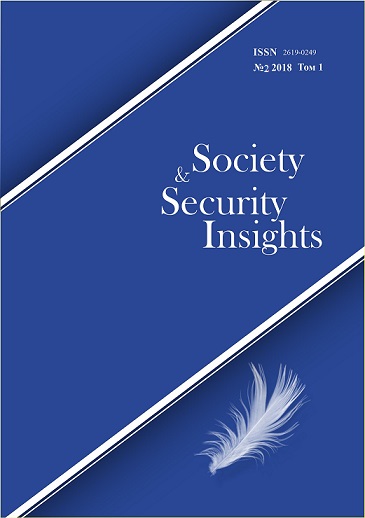MIGRATION TO THE ALTAI TERRITORY: POPULATION’S AWARENESS AND ASSESSMENTS OF MIGRATION SITUATION
Main Article Content
Abstract
The article presents the results of a study of the attitudes of the Altai Region residents to migrants and migration. The main source of data is a questionnaire survey in nine settlements in the Altai Region. Assessments of the migration situation in the region and the attitude towards migrants by the local population are given. Judgments of the inhabitants of the region about the advantages and disadvantages of the presence of migrants in the region, as well as their vision of the most favorable migration policy are described. Factors influencing the image of migration and attitude towards migrants are determined. These include the presence of migrants in a personal environment, the length of residence in the region and the country, the age, the level of education and well-being.
Downloads
Metrics
Article Details
Authors retain the copyright of their manuscripts, and all Open Access articles are distributed under the terms of the Creative Commons Attribution License, which permits unrestricted use, distribution, and reproduction in any medium, provided that the original work is properly cited.
References
Социокультурные и социоструктурные факторы межэтнической напряженности в регионах Российской Федерации: результаты исследования // Информационно-аналитический бюллетень № 2 — 2016.
Левада-центр. Ксенофобия в 2017 году // Аналитический центр Юрия Левады, 2017. URL: https://www.levada.ru/2017/08/23/16486/ (дата обращения: 10.05.2018).
Левада-центр. Отношение к трудовым мигрантам // Аналитический центр Юрия Левады, 2017. URL: https://www.levada.ru/2017/04/28/otnoshenie-k-trudovym-migrantam/ (дата обращения: 15.05.2018).
Миграционные потоки в Алтайском крае в 2016 году // Министерство труда и социальной защиты Алтайского края. URL: http://www.aksp.ru/news/news/20777 (дата обращения: 15.05.2018).
Численность и миграция населения Российской Федерации в 2016 году // Федеральная служба государственной статистики. URL: http://www.gks.ru/wps/wcm/connect/rosstat_main/rosstat/ru/statistics/
publications/catalog/doc_1140096034906 (дата обращения: 15.05.2018).
Amuedo-Dorantes C. and Puttitanun T. Gender Differences in Native Preferences toward Undocumented and Legal Immigration: Evidence from San Diego. Contemporary Economic Policy, 2011, 29(1): 31–45.
Berg J.A. Race, Class, Gender, and Social Space: Using an Intersectional Approach to Study Immigration Attitudes. Sociological Quarterly, 2010, 51(2), 278–302. doi:10.1111/j.1533-8525.2010.01172.x.
Christ O., Hewstone M., Tausch N., Wagner U., Voci A., Hughes J., Cairns E. Direct Contact as a Moderator of Extended Contact Effects: Cross-Sectional and Longitudinal Impact on Outgroup Attitudes, Behavioral Intentions, and Attitude Certainty. Personality and Social Psychology Bulletin, 2010, 36(12), 1662–1674. doi:10.1177/0146167210386969.
Cohrs J.C., Stelzl M. How Ideological Attitudes Predict Host Society Members’ Attitudes toward Immigrants: Exploring Cross-National Differences. Journal of Social Issues, 2010, 66(4), 673–694. doi:10.1111/j.1540-4560.2010.01670.x.
Dempster H., Hargrave K. Understanding public attitudes towards refugees and migrants // CHATAM HOUSE. The Royal Institute of International Affairs. — Working paper 512, June 2017.
Duckitt J., and Sibley C.G. Personality, Ideology, Prejudice, and Politics: A Dual-Process Motivational Model. Journal of Personality, 2010, 78(6), 1861–1893.
Gold S.J., Nawyn S.J. The Routledge International Handbook of Migration Studies, London and New York: Routledge, 2013. doi:10.1111/j.1467-6494.2010.00672.x.
Gorodzeisky A. Who Are the Europeans That Europeans Prefer? Economic Conditions and Exclusionary Views toward European Immigrants. International Journal of Comparative Sociology, 2011, 52(1-2), 100–113. doi:10.1177/0020715210377158
Hainmueller J., Hiscox M.J. Educated Preferences: Explaining Attitudes toward Immigration in Europe. International Organization, 2007, 61(2), 399–442. doi:10.1017/s0020818307070142
Heath A., Richards L. Attitudes towards Immigration and their Antecedents: Topline Results from Round 7 of the European Social Survey. London: European Social Survey ERIC, 2016.
Hodson G., Hogg S.M., MacInnis C.C. The Role Of «Dark Personalities» (Narcissism, Machiavellianism, Psychopathy), Big Five Personality Factors, and Ideology in Explaining Prejudice. Journal of Research in Personality, 2009, 43(4), 686–690. doi:10.1016/j.jrp.2009.02.005
Ipsos MORI. Global views on immigration and the refugee crisis. London: Ipsos MORI, 2016.
Kossowska M., Trejtowicz M., de Lemus S., Bukowski M., Van Hiel A., Goodwin, R. Relationships between Right-Wing Authoritarianism, Terrorism Threat, and Attitudes Towards Restrictions of Civil Rights: A Comparison among Four European Countries. British Journal of Psychology, 2011, No. 102, 245–259.
Kourilova, S. The Individual in Intergroup Relations: From Social Categorization to Prejudice. Ceskoslovenska Psychologie, 2011, 55(1), 12–24.
Markaki Y., Longhi S. What Determines Attitudes to Immigration in European Countries? An Analysis at the Regional Level. In: Norfase migration. Discussion Paper No. 32. 2012.
Oskamp S., Schultz P. W. Attitudes and opinions. Psychology Press, 2005. Sniderman P.M., Hagendoorn L., Prior M. Predisposing Factors and Situational Triggers Exclusionary Reactions to Immigrant Minorities. The American Political Science Review, 2004, 98(1), 35–49.
Pehrson S., Green E.G.T. Who We Are and Who Can Join Us: National Identity Content and Entry Criteria for New Immigrants. Journal of Social Issues, 2010, 66(4), 695–716.
Scheepers P., Gijsberts M., Coenders, M. Ethnic Exclusionism in European Countries. Public Opposition to Civil Rights. European Sociological Review, 2002, 18(1), 17–19. doi:10.1093/esr/18.1.17
Schneider S.L. Anti-Immigrant Attitudes in Europe: Outgroup Size and Perceived Ethnic Threat. European Sociological Review, 2007, 24(1), 53–67. doi:10.1093/esr/jcm034.
Sniderman P. M., Hagendoorn L., Prior M. Predisposing Factors and Situational Triggers: Exclusionary Reactions to Immigrant Minorities. American Political Science Review, 2004, 98(01), 35–49. doi:10.1017/s000305540400098x
TENT. What the world thinks of refugees. New York: TENT Foundation, 2017. Tolsma J., Lubbers M., Coenders, M. Ethnic Competition and Opposition to Ethnic Intermarriage in the Netherlands: A Multi-Level Approach. European Sociological Review, 2008, 24(2), 215–230. doi:10.1093/esr/jcm047

